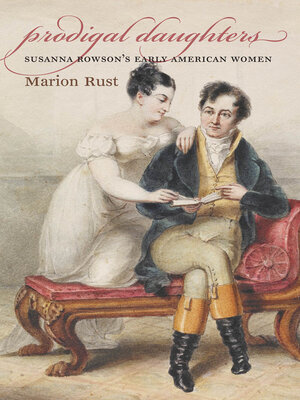Prodigal Daughters
ebook ∣ Susanna Rowson's Early American Women · Omohundro Institute of Early American History and Culture and the University of North Carolina Press
By Marion Rust

Sign up to save your library
With an OverDrive account, you can save your favorite libraries for at-a-glance information about availability. Find out more about OverDrive accounts.
Find this title in Libby, the library reading app by OverDrive.



Search for a digital library with this title
Title found at these libraries:
| Library Name | Distance |
|---|---|
| Loading... |
Susanna Rowson — novelist, actress, playwright, poet, school founder, and early national celebrity — bears little resemblance to the title character in her most famous creation, Charlotte Temple. Yet this best-selling novel has long been perceived as the prime exemplar of female passivity and subjugation in the early Republic. Marion Rust disrupts this view by placing the novel in the context of Rowson’s life and other writings. Rust shows how an early form of American sentimentalism mediated the constantly shifting balance between autonomy and submission that is key to understanding both Rowson’s work and the lives of early American women.
Rust proposes that Rowson found a wide female audience in the young Republic because she articulated meaningful female agency without sacrificing accountability to authority, a particularly useful skill in a nation that idealized womanhood while denying women the most basic rights. Rowson, herself an expert at personal reinvention, invited her readers, theatrical audiences, and students to value carefully crafted female self-presentation as an instrument for the attainment of greater influence. Prodigal Daughters demonstrates some of the ways in which literature and lived experience overlapped, especially for women trying to find room for themselves in an increasingly hostile public arena.
Rust proposes that Rowson found a wide female audience in the young Republic because she articulated meaningful female agency without sacrificing accountability to authority, a particularly useful skill in a nation that idealized womanhood while denying women the most basic rights. Rowson, herself an expert at personal reinvention, invited her readers, theatrical audiences, and students to value carefully crafted female self-presentation as an instrument for the attainment of greater influence. Prodigal Daughters demonstrates some of the ways in which literature and lived experience overlapped, especially for women trying to find room for themselves in an increasingly hostile public arena.







